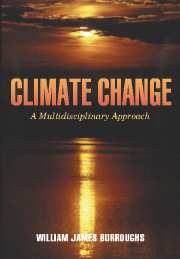Book contents
- Frontmatter
- Contents
- Preface
- Acknowledgements
- List of Boxes
- 1 INTRODUCTION
- 2 RADIATION AND THE EARTH'S ENERGY BALANCE
- 3 THE ELEMENTS OF THE CLIMATE
- 4 EVIDENCE OF CLIMATE CHANGE
- 5 CONSEQUENCES OF CLIMATE CHANGE
- 6 THE MEASUREMENT OF CLIMATIC CHANGE
- 7 STATISTICS, SIGNIFICANCE AND CYCLES
- 8 THE CAUSES OF CLIMATIC CHANGE
- 9 MODELLING THE CLIMATE
- 10 PREDICTING CLIMATE CHANGE
- Bibliography
- Glossary
- Index
- Frontmatter
- Contents
- Preface
- Acknowledgements
- List of Boxes
- 1 INTRODUCTION
- 2 RADIATION AND THE EARTH'S ENERGY BALANCE
- 3 THE ELEMENTS OF THE CLIMATE
- 4 EVIDENCE OF CLIMATE CHANGE
- 5 CONSEQUENCES OF CLIMATE CHANGE
- 6 THE MEASUREMENT OF CLIMATIC CHANGE
- 7 STATISTICS, SIGNIFICANCE AND CYCLES
- 8 THE CAUSES OF CLIMATIC CHANGE
- 9 MODELLING THE CLIMATE
- 10 PREDICTING CLIMATE CHANGE
- Bibliography
- Glossary
- Index
Summary
We are all inclined to take the climate for granted. We are basically acclimatised to the seasonal cycle and most of the variations that occur from day to day and week to week. It is all too easy to forget just how much of this comfort depends on the fact that our buildings, food and energy supplies, health and transport systems and leisure activities are carefully designed to meet the challenges of the local climate. But, when extreme events occur, it becomes acutely apparent how vulnerable much of the infrastructure of society is to climatic fluctuations. Droughts, floods, heatwaves and windstorms (including hurricanes and tornadoes) can all have disastrous consequences.
This sense of independence is often sometimes compounded by our travels. If we jet around the world staying in air-conditioned hotels or indulging in well-equipped holiday facilities, again we can fall into the trap of assuming that we are relatively independent of the weather. If, however, we are stripped of our protective shell and forced to confront the extremes of the tropics, deserts, high mountains and polar wastes, we can become painfully aware of just how forbidding the challenges of many climatic zones are. What is more, for many of the people living in the developing world, where extreme weather events have become a mounting threat to their way of life, these challenges are of vital concern. So, on an increasingly crowded planet it is hardly surprising that the subject of climate change has become a hot topic.
- Type
- Chapter
- Information
- Climate ChangeA Multidisciplinary Approach, pp. ix - xiiPublisher: Cambridge University PressPrint publication year: 2001



